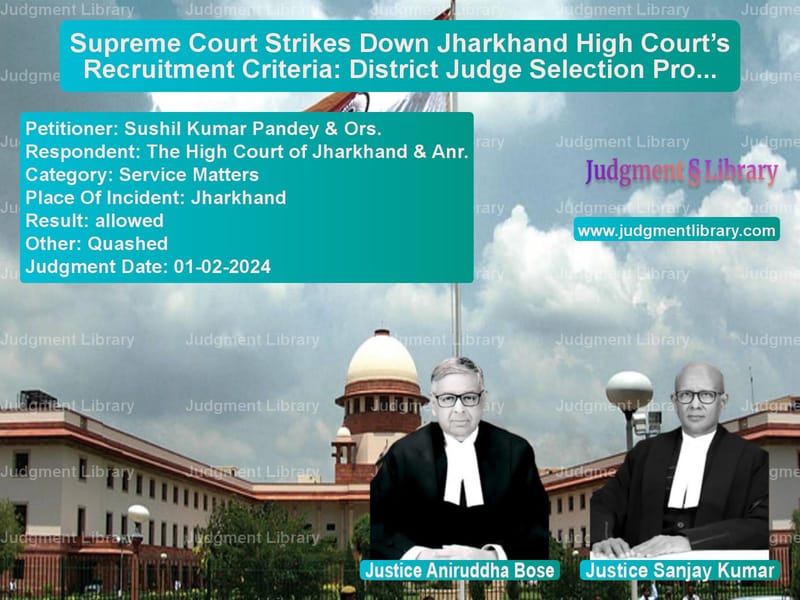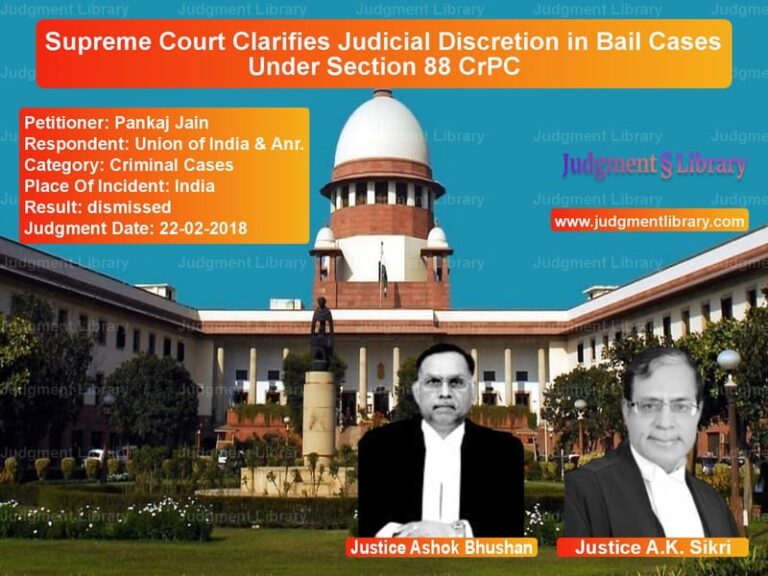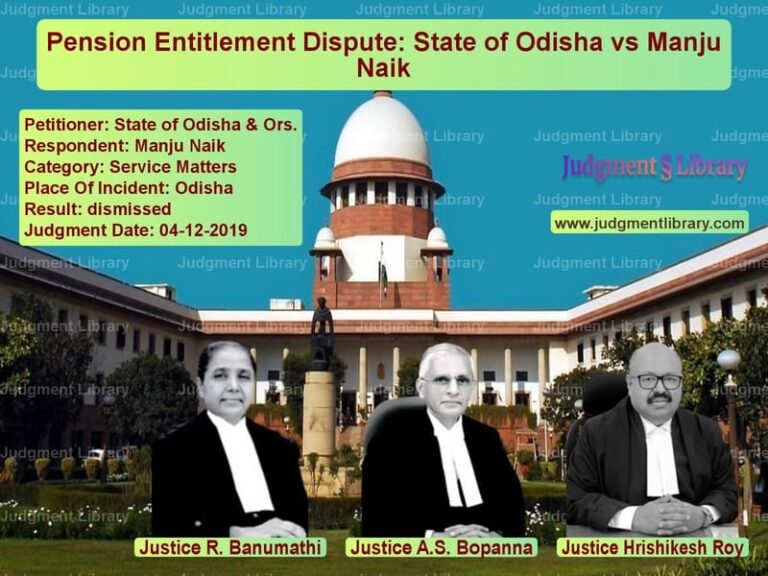Supreme Court Strikes Down Jharkhand High Court’s Recruitment Criteria: District Judge Selection Process Declared Unfair
The Supreme Court of India recently adjudicated on the fairness and legality of the District Judge selection process in Jharkhand. The case, Sushil Kumar Pandey & Ors. vs. The High Court of Jharkhand & Anr., revolved around the recruitment process initiated in 2022 under Advertisement No. 01/2022. The dispute arose when the Jharkhand High Court, in its Full Court resolution dated 23rd March 2023, imposed a new criterion requiring candidates to secure at least 50% aggregate marks to qualify for appointment. This decision was taken after the selection process had been completed, which led to the exclusion of nine candidates who were otherwise eligible under the pre-existing rules.
Background of the Case
In March 2022, the Jharkhand High Court advertised 22 vacancies for District Judges under the Jharkhand Superior Judicial Service (Recruitment, Appointment, and Conditions of Service) Rules, 2001 (the ‘2001 Rules’). A selection process was conducted, consisting of:
- A Main Examination (200 marks).
- A Viva-Voce Test (40 marks).
According to the rules, the final merit list was to be prepared based on the aggregate marks obtained in these two components. The rules prescribed a minimum of 20 marks in the viva-voce for eligibility.
Petitioners’ Arguments
The petitioners, represented by senior advocates Dushyant Dave, Vinay Navare, and Jayant K. Sud, argued that:
- The imposition of the 50% aggregate criterion was not mentioned in the recruitment rules or the advertisement.
- The change in selection criteria after the examination process was unlawful and arbitrary.
- The High Court could not alter the rules after candidates had already undertaken the examination.
- According to previous Supreme Court rulings, rules of recruitment cannot be changed mid-way.
Respondent’s Arguments
The Jharkhand High Court, represented by senior advocate Jaideep Gupta, defended its decision, stating:
- The 50% aggregate requirement was introduced to ensure a higher standard in judicial appointments.
- The court’s administrative powers allowed it to set higher benchmarks for appointment.
- There was no automatic right to appointment for candidates who merely met the eligibility criteria.
Supreme Court’s Findings
The Supreme Court, comprising Justices Aniruddha Bose and Sanjay Kumar, ruled in favor of the petitioners. The key findings were:
- Rules cannot be changed mid-selection: The Court cited precedents stating that recruitment rules must remain consistent throughout the selection process.
- Violation of the 2001 Rules: The High Court’s decision contradicted Rule 21, which prescribes the selection process.
- Arbitrary exclusion: The nine excluded candidates had already qualified under the advertised criteria.
Key Judicial Observations
The Supreme Court made strong observations regarding the Jharkhand High Court’s approach:
“If the High Court is permitted to alter the selection criteria after the performance of individual candidates is assessed, that would constitute alteration of the laid-down rules.”
Further, the Court ruled that:
“The change in criteria after the examination was unfair to the candidates who had already gone through the process with a legitimate expectation that the existing rules would apply.”
Final Judgment
The Supreme Court:
- Struck down the 50% aggregate requirement imposed by the Full Court resolution.
- Directed the Jharkhand High Court to recommend the names of the successful candidates based on the original selection process.
- Emphasized that recruitment must adhere to advertised and pre-existing rules to maintain fairness.
Impact of the Judgment
This ruling has significant implications for judicial recruitment in India:
- Ensures fairness: Prevents changes in recruitment criteria after the process has started.
- Protects candidates’ rights: Upholds the principle that candidates must be judged based on published selection rules.
- Maintains judicial accountability: Reinforces the need for courts to follow legal and procedural norms in recruitment.
Conclusion
The Supreme Court’s decision in Sushil Kumar Pandey & Ors. vs. The High Court of Jharkhand & Anr. is a landmark judgment that reiterates the fundamental principle that recruitment rules must remain unchanged during the selection process. By striking down the arbitrary imposition of new criteria, the Court has safeguarded the integrity of the judicial recruitment process and upheld the rights of candidates.
Petitioner Name: Sushil Kumar Pandey & Ors..Respondent Name: The High Court of Jharkhand & Anr..Judgment By: Justice Aniruddha Bose, Justice Sanjay Kumar.Place Of Incident: Jharkhand.Judgment Date: 01-02-2024.
Don’t miss out on the full details! Download the complete judgment in PDF format below and gain valuable insights instantly!
Download Judgment: sushil-kumar-pandey-vs-the-high-court-of-jh-supreme-court-of-india-judgment-dated-01-02-2024.pdf
Directly Download Judgment: Directly download this Judgment
See all petitions in Recruitment Policies
See all petitions in Public Sector Employees
See all petitions in Employment Disputes
See all petitions in Judgment by Aniruddha Bose
See all petitions in Judgment by Sanjay Kumar
See all petitions in allowed
See all petitions in Quashed
See all petitions in supreme court of India judgments February 2024
See all petitions in 2024 judgments
See all posts in Service Matters Category
See all allowed petitions in Service Matters Category
See all Dismissed petitions in Service Matters Category
See all partially allowed petitions in Service Matters Category







